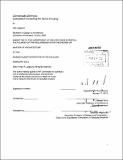Domestically dextrous : embedded computing for senior housing
Author(s)
Legband, Neil (Neil Robert)
DownloadFull printable version (32.14Mb)
Alternative title
Embedded computing for senior housing
Other Contributors
Massachusetts Institute of Technology. Department of Architecture.
Advisor
J. Meejin Yoon.
Terms of use
Metadata
Show full item recordAbstract
This thesis proposes a new home for the aging baby boomers. The US is about to see a massive influx in the elderly population, and the current model of housing the elderly is woefully unprepared. The boomer generation has lived in single family homes for decades, and will want to continue living in one. Current strategies for retrofitting homes for seniors, things like wheelchair ramps, stair lifts, grab bars, are remarkably ill-suited to properly accommodate the needs of the elderly. Incorporating embedded computation into the home will allow the elderly to maintain their independence, and live in an environment which accommodates their expanding and changing needs as they deteriorate both mentally and physically. The home will take an active role in monitoring the occupant, monitoring itself, adapting to the changing physical/mental dexterity of the occupants, as well as assisting with domestic activities. Given the varying degrees of complexity that exist at the interface between the systems required to perform these activities and traditional residential stick frame construction, a new type of home which integrates electronics while also altering typical programmatic definitions within the domestic space.
Description
Thesis (M. Arch.)--Massachusetts Institute of Technology, Dept. of Architecture, 2013. Cataloged from PDF version of thesis. Includes bibliographical references (p. 122-123).
Date issued
2013Department
Massachusetts Institute of Technology. Department of ArchitecturePublisher
Massachusetts Institute of Technology
Keywords
Architecture.